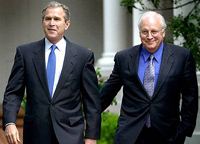Bush, Cheney leaded Libby's leak campaign on Iraq critics
I. Lewis "Scooter" Libby apparently had serious qualms about leaking classified intelligence to the media, but he was quickly persuaded to drop them. There was pressure from his boss, Vice President Dick Cheney, who advised him that the U.S. president had authorized Libby to do so. End of discussion. That's the picture that emerges from court papers filed by the prosecutor in the CIA leak case against Libby, who is depicted as doing the bidding of President George W. Bush and Cheney in striking back at administration critic Joseph Wilson.

On Thursday, disclosure of official authorization for Libby's leaks to reporters brought strong criticism from administration political foes, but little likelihood that their demands for explanations will be met. Sen. John Kerry, a Massachusetts Democrat, citing Bush's call two years ago to find the person who leaked the CIA identity of Wilson 's wife, Valerie Plame, said the latest disclosures meant the president needed to go no further than a mirror.
In his court filing, Special Counsel Patrick Fitzgerald asserted that "the president was unaware of the role" that Libby "had in fact played in disclosing" Plame's CIA status. The prosecutor gave no such assurance, though, regarding Cheney. Senate Democratic leader Harry Reid, of Nevada , said that "in light of today's shocking revelation, President Bush must fully disclose his participation in the selective leaking of classified information. The American people must know the truth."
Attorney General Alberto Gonzales said the president had the "inherent authority to decide who should have classified information." The White House declined to comment, citing the ongoing criminal investigation into the leak of Plame's identity. In July 2003, Wilson 's accusation that the Bush administration had twisted prewar intelligence to exaggerate the Iraqi threat "was viewed in the office of vice president as a direct attack on the credibility of the vice president, and the president," Fitzgerald's court papers stated.
Part of the counterattack was a July 8, 2003 , meeting with New York Times reporter Judith Miller at which Libby discussed the contents of a then-classified CIA report that seemed to undercut what Wilson was saying in public. Separately, Libby said he understood he also was to tell Miller that prewar intelligence assessments had been that Iraq was "vigorously trying to procure" uranium, the prosecutor stated. In the run-up to the war, Cheney had insisted Iraq was trying to build a nuclear bomb.
The conclusion on uranium was contained in a National Intelligence Estimate, a consensus document of the U.S. intelligence community. Libby's statements came in grand jury testimony before he was charged with five counts of perjury, obstruction and lying to the FBI in the Plame probe. Libby at first told the vice president that he could not have the July 8, 2003 , conversation with Miller because of the classified nature of the National Intelligence Estimate on Iraq , Fitzgerald said. Libby testified to the grand jury "that the vice president later advised him that the president had authorized defendant to disclose the relevant portions" of the NIE.
Libby testified that he also spoke to David Addington, then counsel to the vice president, "whom defendant considered to be an expert in national security law, and Mr. Addington opined that presidential authorization to publicly disclose a document amounted to a declassification of the document." Libby testified that he was specifically authorized to disclose the key judgments of the classified intelligence document because it was thought that its conclusions were "fairly definitive" against what Wilson had said, and the vice president thought that it was "very important" for those key judgments to come out, the court papers stated.
After Wilson began attacking the administration, Cheney had a conversation with Libby, expressing concerns on whether a CIA-sponsored trip to the African nation of Niger by Wilson "was legitimate or whether it was in effect a junket set up by Mr. Wilson's wife," Fitzgerald wrote. The suggestion that Plame sent her husband on the Africa trip has gotten widespread circulation among White House loyalists. Wilson said he had concluded on his trip that it was highly doubtful Niger had sold uranium yellowcake to Iraq .
The prosecutor's court papers offer a glimpse inside the White House when the Justice Department launched a criminal investigation of the Plame leak in September 2003. Libby "implored White House officials" to issue a statement saying he had not been involved in revealing Plame's identity, and that when his initial efforts met with no success, he "sought the assistance of the vice president in having his name cleared," the prosecutor stated. The White House eventually said neither Libby nor Karl Rove had been involved in the leak. Rove remains under criminal investigation, reports the AP.
N.U.
Subscribe to Pravda.Ru Telegram channel, Facebook, RSS!


